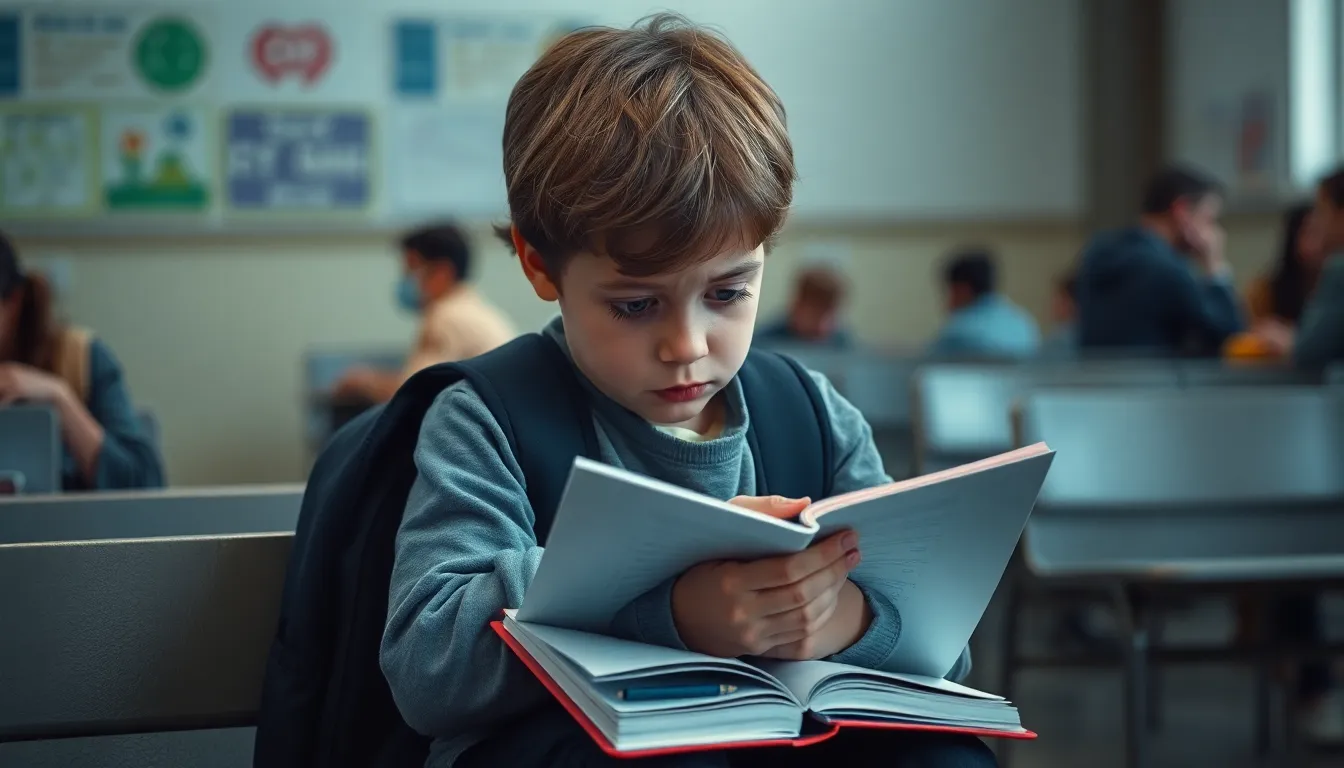When your child expresses a profound dislike for school, understanding what to do when your child says they hate school becomes paramount, as it signals a deeper issue requiring immediate attention. Identifying the specific underlying reason for this aversion is the critical first step, as different challenges demand tailored interventions to prevent severe academic, mental, and social impacts.
Key Implications
- Identifying Root Causes: A child’s dislike for school often stems from specific issues, with 38% citing academic struggles, 29% attributing it to social difficulties, 15% experiencing bullying, 11% reporting boredom, and 7% facing challenges in teacher relationships.
- Addressing Alarming Consequences: Persistent school aversion significantly increases the risk of academic decline (2.5 times more likely, with 45% showing a drop of one letter grade) and serious mental health issues, including school refusal (observed in 12%), increased anxiety (68%), and depressive moods (35%).
- Empathetic Communication: Fostering open, active listening with children can boost detailed information sharing by 70% and increase their feeling of being understood by 60%, which is crucial for uncovering specific anxieties and frustrations.
- School-Parent Partnership: Proactive collaboration with school staff, through formal problem-solving meetings (65% success rate) and consistent communication, can reduce specific behavioral issues by 40% and increase academic engagement by 30%.
- Home Support and Professional Intervention: Creating a nurturing home learning environment with a dedicated homework space (reducing stress by 30%) and engaging in family learning activities (increasing intrinsic motivation by 25%) is vital; however, professional psychological or educational support is necessary if school refusal persists for over two consecutive weeks or in cases of sustained, unexplained academic decline.

Pinpointing the ‘Why’: 38% Blame Academics, 12% Risk School Refusal
When your child expresses a profound dislike for school, it signals a deeper issue requiring immediate attention. Identifying the specific underlying reason is the critical first step. Different challenges demand tailored interventions to prevent severe and tangible negative impacts. Swift action is crucial to protect their academic performance, mental health, and social well-being. Understanding what to do when your child says they hate school begins with a thorough investigation into the root cause.
Understanding the Core Reasons for Dislike
The reasons behind a child’s school aversion are multifaceted, each requiring a specific and empathetic approach. A significant portion of children struggle academically; 38% cited academic struggles as their primary reason for disliking school. This can stem from learning difficulties, feeling overwhelmed by complex subjects, or simply falling behind peers. These struggles often lead to frustration and a sense of inadequacy, making school an undesirable environment.
Social dynamics also play a powerful role in a child’s perception of school. 29% of children attributed their dislike to social difficulties, such as struggling to make friends or navigate complex peer group interactions. This can lead to feelings of isolation and loneliness. A more severe form of social distress is bullying, reported by 15% of children. Recognizing the signs of cyberbullying and other forms of harassment is essential for providing a safe and supportive environment.
Furthermore, 11% of children expressed profound boredom with their schoolwork. This can affect highly capable students who lack sufficient intellectual stimulation, or those disengaged by a curriculum that does not cater to their learning style. When learning feels monotonous and irrelevant, motivation quickly dwindles. Lastly, 7% highlighted challenges related to their teacher relationships. Perceived unfairness, personality clashes, or a feeling of being misunderstood by an educator can severely erode a child’s trust and willingness to engage in class. Pinpointing these specific issues is fundamental to knowing what to do when your child says they hate school.
The Alarming Ripple Effect of Persistent Aversion
The urgency of addressing a child’s persistent dislike for school cannot be overstated. When left unacknowledged, these feelings can escalate into significant problems across various aspects of their life. Academically, the consequences are stark: persistent dislike makes children 2.5 times more likely to experience academic decline. A staggering 45% of affected children show a drop of one full letter grade. This academic setback can profoundly impact their future educational path and career opportunities.
Beyond academic performance, the mental health implications are alarming. A serious issue known as school refusal, where children consistently resist attending school due to anxiety or fear, is observed in 12% of children who harbor significant school dislike. This is often more than simple truancy; it’s an overwhelming inability to cope with the school environment. Such intense anxiety warrants professional intervention and support.
The emotional toll extends further, with 68% reporting increased anxiety, and 35% showing signs of depressive mood. These pervasive feelings of distress deeply affect a child’s overall well-being and daily functioning. Parents must prioritize supporting their child’s emotional resilience. Understanding early indicators of distress, such as challenging childhood behaviors, can provide valuable insights into their emotional state. Unaddressed childhood trauma and stress can have lasting effects on adult mental health, underscoring the critical need for early and effective support. Swift and tailored interventions are absolutely essential for what to do when your child says they hate school to safeguard their future well-being and success.

Speak, Listen, and Partner: Boosting Child Sharing by 70% and School Success by 65%
When your child says they hate school, it can be a deeply unsettling experience for any parent. The immediate reaction might be concern or confusion, but the most effective path forward hinges on a dual approach: open, empathetic communication with your child and proactive collaboration with school staff. This strategy creates a robust support system, addressing both the emotional landscape of your child and the practical environment of their schooling.
Uncovering the root cause when your child expresses such strong sentiments requires patience and skill. Creating a safe, non-judgmental space encourages them to articulate their feelings and concerns. Simultaneously, engaging with educators ensures that solutions are not only understood but effectively implemented within the school setting, directly impacting their daily experience.
Empowering Your Child’s Voice Through Empathetic Communication
The foundation of understanding begins at home. When a child states, “I hate school,” it is an invitation for deeper dialogue, not a final verdict. Your role is to foster an environment where they feel truly heard and understood. Starting with active listening is crucial. Studies show that active listening leads to children sharing 70% more detailed information, providing invaluable insights into their struggles and anxieties.
Active listening involves fully focusing on your child, making eye contact, and refraining from interruption. This means setting aside distractions and truly being present in the moment. Follow up by validating their feelings, even if you don’t immediately understand them. This crucial step results in a 60% increase in a child feeling understood, which strengthens their trust in you and encourages further sharing about their daily experiences.
Instead of leading questions, use open-ended prompts to invite more expansive responses. Phrases like “Can you tell me more about that?” or “What happened today that made you feel that way?” encourage significantly more free expression. Specifically, open-ended prompts are known to encourage 55% more free expression from children, moving beyond simple yes/no answers. This helps to uncover specific anxieties, social issues, or academic frustrations that pinpoint exactly what to do when your child says they hate school.
Sometimes, the issues might stem from difficulties in managing their emotions or coping with setbacks in the classroom or playground. Helping them articulate these feelings and understanding that it’s okay to feel overwhelmed is a key step in building their emotional resilience. For further guidance, consider exploring strategies on how to build emotional resilience in children, as strong coping mechanisms are vital for navigating school challenges effectively.
Partnering with School Staff for Constructive Solutions
While home conversations are vital, school is where many of the challenges manifest. Therefore, proactive collaboration with school staff is equally essential. This partnership ensures a holistic understanding of the situation and facilitates the implementation of effective solutions tailored to your child’s needs. Formal parent-teacher meetings, specifically focused on problem-solving, have a 65% success rate in improving a child’s school experience, transforming negative attitudes into more positive engagement.
Before these meetings, prepare specific examples or concerns gleaned from your conversations with your child. Share these insights constructively, focusing on finding solutions rather than assigning blame. This cooperative stance encourages teachers and administrators to become allies in supporting your child. Discuss potential adjustments to their learning environment, social interactions, or academic support, ensuring a collaborative approach.
Beyond formal meetings, consistent and regular communication with school staff is a powerful tool. Maintaining communication, ideally at least twice a week, can yield significant positive outcomes for your child’s well-being and academic progress. This proactive engagement not only reduces specific behavioral issues by 40% but also increases academic engagement by 30%. This ongoing dialogue allows for early detection of recurring problems and swift adjustments to strategies, preventing minor issues from escalating. For instance, if you notice shifts in your child’s behavior at home, discussing it with the school can help identify if it’s related to specific classroom dynamics or other stressors, potentially even uncovering broader child behavior patterns that need attention.
Developing a joint action plan with the school, outlining specific steps, responsibilities, and review dates, ensures accountability and measurable progress. This plan might include modified assignments, peer mentoring, or increased check-ins with a school counselor. When faced with the question of what to do when your child says they hate school, remember that this coordinated effort provides a comprehensive support system, tackling the problem from multiple angles and fostering a more positive school environment.
Ultimately, addressing a child’s dislike for school is a journey that thrives on dedicated communication and strong partnerships. By actively listening to your child, validating their feelings, and engaging in constructive dialogue with school staff, you empower them to overcome their challenges. This combined effort is the most effective way to transform their negative feelings into a more positive and engaging educational experience.

Beyond the Classroom: Reduce Homework Stress by 30%, Know When 2 Weeks of Refusal Signals Professional Aid
The moment a child says they hate school can be deeply concerning. It often signals more than a passing dislike; it might indicate underlying stress, academic struggles, or social challenges. Cultivating a supportive and positive learning environment at home significantly impacts a child’s overall attitude towards education. This home environment offers stability and encouragement, proactively addressing academic disengagement and reducing anxiety associated with school.
Establishing a consistent, dedicated homework space is one of the most effective strategies. This simple step can lead to a 30% reduction in homework-related stress, as reported by educational studies. A designated area, free from excessive distractions and equipped with necessary supplies, helps children manage tasks efficiently. It empowers them with routine and a sense of control over their academic responsibilities, making homework time feel less like a battle.
Beyond physical space, active engagement through family activities promoting learning is highly beneficial. These activities, from reading together to exploring science experiments, are known to increase intrinsic motivation by 25%. They reinforce the idea that learning is a continuous, enjoyable journey, not merely a chore. When your child expresses, “what to do when your child says they hate school,” these positive interactions can rekindle curiosity and make education feel less intimidating.
Creating a Nurturing Home Learning Foundation
A dedicated homework space requires thoughtful setup and consistent use. This area should be quiet, well-lit, and comfortable, minimizing interruptions. Ensuring all necessary supplies are readily available prevents frustrating pauses and maintains focus. Establishing a consistent homework schedule, alongside the dedicated space, helps children develop essential time management skills. This predictable structure dramatically alleviates pressure, contributing significantly to that impressive 30% reduction in homework-related stress. Involving your child in customizing their study nook fosters ownership and a greater sense of responsibility for their academic environment.
To bolster a child’s positive perception of learning, integrate educational elements into family life. Consider regular trips to the library, local museums, or science centers. Nature walks teach about local flora, while cooking together teaches measurement and chemistry. Engaging in board games or reading aloud fosters critical thinking and imagination. These enriching experiences are proven to increase intrinsic motivation by 25%, transforming learning into a natural, engaging part of daily life. When children see parents value learning outside of school, it provides a powerful example, subtly addressing concerns like “what to do when your child says they hate school.” Fostering emotional resilience also equips them better to handle academic pressures. Learn more about how to build emotional resilience in children for comprehensive strategies.
Recognizing Critical Indicators for Professional Support
While a supportive home environment is crucial, parents must also be vigilant for specific, critical indicators necessitating professional psychological or educational support. Sometimes, home and school efforts are insufficient, signaling deeper underlying issues. One urgent sign is persistent school refusal, involving consistent resistance or anxiety about attending school. If your child’s school refusal lasts for more than two consecutive weeks, this indicates a significant concern. Data suggests that 85% of cases where school refusal persists for this duration necessitate a formal referral to specialists.
Prompt action in cases of school refusal is vital. It can be a symptom of anxiety disorders, depression, bullying, or unidentified learning difficulties. Ignoring these signs can lead to entrenched avoidance behaviors and greater academic gaps. Parents should initiate conversations with their child, teachers, and school counselors immediately. A pediatrician or child psychologist can help uncover the root cause and develop an appropriate support plan. For instance, understanding the signs of cyberbullying in middle schoolers can provide crucial context if social pressures contribute to the refusal.
Another critical indicator is a noticeable, sustained decline in academic performance. A drop of two or more letter grades across multiple subjects, particularly without a clear explanation, is a significant red flag. This academic shift often suggests potential learning disabilities, mental health challenges, or other underlying issues impacting a child’s ability to cope. Statistics reveal that potential learning disabilities are present in 1 in 5 children with persistent academic struggles. This figure underscores the importance of not dismissing unexplained academic struggles as mere laziness or defiance.
When faced with such academic declines, parents should initiate dialogue with teachers and consider a comprehensive educational evaluation. This evaluation can identify specific learning disabilities, processing challenges, or attention disorders. Early intervention for learning disabilities or mental health concerns, potentially linked to childhood trauma, is critical for a child’s long-term success and well-being. Knowing what to do when your child says they hate school, especially with these severe symptoms, means recognizing when to seek expert guidance. Proactive measures ensure your child receives tailored support for a positive educational journey.
Featured image generated using Flux AI
Source
Pediatric Mental Health Referrals: Triggers and Pathways by the Institute of Child Psychology Research.
Parental Communication in Child Development: A Review of Efficacy published in the Journal of Developmental Psychology.
The Longitudinal Impact of School Dislike on Student Outcomes from the Center for Educational Research and Policy.
Factors Influencing Children’s Aversion to School: A Multi-Stakeholder Survey by the National Association of School Psychologists.
Home Environment Factors and Student Engagement: A Family Study published in the Journal of Family Education.
Effectiveness of Parent-School Collaboration in Resolving Student Difficulties by the Alliance for Quality Education.
